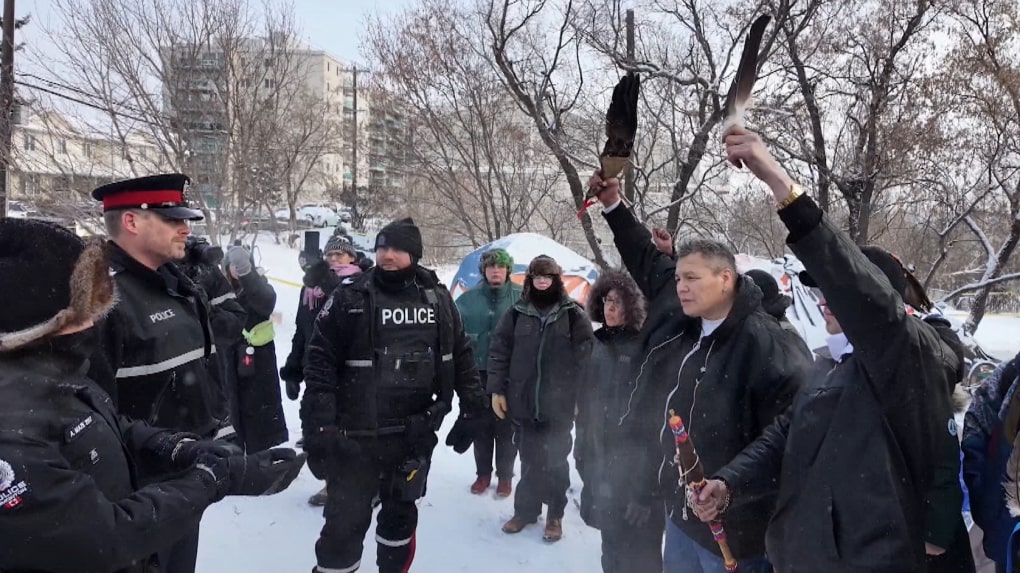
Forced sweeps of homeless encampments in Edmonton: Revealing the hollow promises of reconciliation
By Fiza Mubashir, February 13 2024—
The Edmonton Police Service (EPS) is forcibly removing homeless encampments within its jurisdiction while disproportionately targeting the Indigenous population. Such expulsions contravene Indigenous Treaty Rights as specified by principle eight of the National Protocol for Homeless Encampments in Canada. Moreover, amidst the sweeps, EPS members are conducting wrongful arrests under the pretext of detainees “obstructing police.” These violent dispossessions are a byproduct of protests by locals in the Edmonton region who are calling for the removal of homeless camps.
One in ten Indigenous persons living off-reserve experience homelessness. Indigenous overrepresentation among the homeless population is concerning, especially given their disproportionate presence in the overall population. Federal aid for Indigenous housing is a constant concern for on-reserve residents, however, the situation is even more dire for those living off-reserves. A report by the parliamentary budget officer revealed a yearly deficit of $636 million. The gap indicates a substantial difference between what Indigenous households in urban and rural areas can afford to pay versus actual housing costs. This disparity exists due to the federal government’s lack of effort to support the Indigenous population during a national housing crisis.
Now, to make matters worse, those merely trying to survive the brutal housing catastrophe are being subjected to institutional maltreatment. Why? Because fellow citizens are growing too weary of having to look at these individuals in public places. As Roy Cardinal, an Indigenous camp resident, stated in a video captured by CTV news, “What does this piece of land mean to them that they gotta come and shuffle us and watch it every day be empty? Is it because they’re sightseeing? Aren’t we part of the sightseeing?”
Roy Cardinal could not have depicted the irony any better. The paradox lies in the fact that various reconciliatory practices, such as territorial acknowledgments, were created on the premise of challenging the settler-colonial notion terra nullius — a myth used by colonists to justify the occupation of “empty land.” The reiteration of land acknowledgments in various settings, such as lectures and ceremonies, implies a degree of dedication to reconciliation in Canada. Unfortunately, this assumption is incongruent with reality. The land that people are uttering these acknowledgments on is the same land where they cannot stand the sight of homeless Indigenous individuals.
The performative angles of reconciliation heavily contribute to the recurrence of instances of dispossession, as evident in the experiences of Roy Cardinal and numerous individuals like him. Territorial acknowledgments transcend mere performance when accompanied by action; actions lend substance to these statements. Shelters and campsites are a temporary fix to the entrenched issue of homelessness. Long-term measures, while more expensive, consist of access to affordable housing and mental health care for the Indigenous community. Such demands have been reiterated ad nauseam by Nunavut’s MP Lori Idlout, however, she has been constantly sidelined and dismissed by the federal government. Genuine reconciliation involves listening to the concerns of Idlout and other Indigenous leaders like her to combat the rise of homelessness in their respective communities.
That said, this is an extensive process demanding substantial time and effort. In the meantime, as individuals, we can work towards deconstructing harmful narratives regarding homelessness. When discussing homelessness in Canada, Erin Dej writes about the ramifications of responsibilization techniques in her book, A Complex Exile. She defines responsibilization techniques as emphasizing the individual’s fault as opposed to socio-structural conditions. As Dej states, “Indigenous Peoples’ oppression during the outset of colonization is mirrored today in the disproportionate number of Indigenous Peoples experiencing homelessness.” The responsibilization of Indigenous people disregards the impact of settler-colonial institutions and perpetuates harmful stereotypes against them. For this reason, we must steer clear of such discourse and instead highlight the systemic barriers to housing for Indigenous people.
The forced sweeps of homeless encampments in Edmonton infringe on Indigenous Treaty Rights and Land Settlements. Such removals are antithetical to Canada’s professed claims of meaningful reconciliation. Therefore, Canadian institutions and individuals must work towards genuine reconciliation and not rely on symbolic gestures alone. Institutions must assist Indigenous communities during the housing crisis, while individuals must cultivate greater empathy and tolerance for those more vulnerable than them.
This article is a part of our Opinions section and does not necessarily reflect the views of the Gauntlet editorial board.
